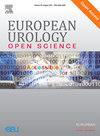Impact of Antiaggregant and Anticoagulant Medications on Perioperative Complications in Upper Tract Urothelial Carcinoma
IF 3.2
3区 医学
Q1 UROLOGY & NEPHROLOGY
引用次数: 0
Abstract
Background and objective
Contemporary data are limited regarding the clinical practice of administering anticoagulant and antiplatelet medications (AA) perioperatively for patients with upper tract urothelial carcinoma (UTUC). Our aim was to investigate real-world AA perioperative management among patients with UTUC who underwent radical nephroureterectomy (RNU) and the impact on perioperative complications.
Methods
We conducted a retrospective analysis of data from the Clinical Research Office of the Endourology Society UTUC registry. Patients were stratified into two groups according to perioperative AA use in the RNU cohort. Baseline characteristics were compared between the control and AA groups and intraoperative and postoperative complications were analyzed. We also conducted subgroup analysis for patients who discontinued AA use in comparison to those who continued AA therapy. Univariable and multivariable analyses were performed to identify predictors of perioperative complications.
Key findings and limitations
A total of 1264 patients who underwent RNU were included in the analysis. Of these, 393 (31%) had AA treatment before RNU and 871 (69%) did not. Intraoperative complications occurred in 23 patients (5.9%) in the AA group and 41 (4.7%) in the control group. Postoperative complications occurred in 101 patients (26%) in the AA group and 182 (21%) in the control group. Multivariable logistic regression demonstrated that AA was not an independent risk factor for either intraoperative complications (odds ratio 0.93, 95% confidence interval [CI] 0.48–1.83; p = 0.84) or postoperative complications (odds ratio 0.93, 95% CI 0.66–1.30; p = 0.66).
Conclusions and clinical implications
Anticoagulant and antiaggregant therapy in patients undergoing RNU is safe, with no difference in the incidence of intraoperative and postoperative complications.
Patient summary
Our analysis for patients with cancer in the upper urinary tract showed that taking drugs to prevent blood clots before surgery to remove a kidney is safe. We found no significant differences in complication rates in comparison to patients not taking these drugs.
The Clinical Research Office of the Endourology Society UTUC registry study is registered on ClinicalTrials.gov as NCT02281188.
求助全文
约1分钟内获得全文
求助全文
来源期刊

European Urology Open Science
UROLOGY & NEPHROLOGY-
CiteScore
3.40
自引率
4.00%
发文量
1183
审稿时长
49 days
 求助内容:
求助内容: 应助结果提醒方式:
应助结果提醒方式:


